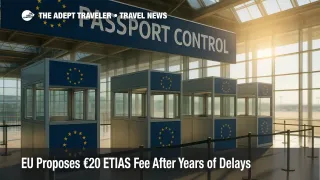EU Proposes €20 ETIAS Fee After Years of Delays

International travelers heading to Europe will soon pay more. The European Commission has asked the Council and Parliament to sign off on a €20 fee for the European Travel Information and Authorization System (ETIAS), tripling the €7 price set in 2018. The charge would take effect when the long-awaited visa-waiver program finally launches in the last quarter of 2026, two years later than its previous target. Officials say higher revenue is needed to cover inflation, upgraded automation, and tighter security.
Key Points
- Why it matters: Higher fees and prolonged delays affect trip planning for 60 visa-exempt nations, including the United States.
- ETIAS fee to rise from €7 to €20, pending two-month review by Council and Parliament.
- Launch now scheduled for late 2026, following prior targets in 2021, 2023, 2024, and 2025.
- Children under 18, seniors over 70, and eligible EU-family members remain exempt from the fee.
Snapshot
ETIAS is Europe's forthcoming electronic travel authorization, modeled on the United States' ESTA. Once live, travelers from 60 visa-exempt countries will file an online form with passport, itinerary, and basic health and security data before boarding flights, cruises, or trains into any of the 30 participating Schengen-area and associated states. Most applications will auto-approve within minutes and last three years or until the passport expires. The new €20 charge-about $22 USD-would fund upgraded automation, encryption, and coordination with the Entry/Exit System (EES). Fee waivers apply to minors, seniors, and certain family members of EU citizens. Payments will be taken by credit or debit card only.
Background
Lawmakers adopted the ETIAS Regulation in September 2018, initially aiming to open the platform in 2021 (Unverified) alongside other "Smart Borders" projects. Technical complexity, pandemic disruptions, and downstream dependencies-most notably the biometric Entry/Exit System-forced successive timetable resets: first to 2023, then November 2024, then 2025. In March 2025, interior ministers approved a revised roadmap moving EES to October 2025 and ETIAS to the last quarter of 2026. While core software is largely finished, member states still need to link national border hardware, train agents, and complete security and privacy certifications before the system can go live. The latest fee proposal provides a fresh funding stream to sustain those roll-out tasks and to align ETIAS pricing with comparable programs such as the U.S. ESTA ($21) and the U.K.'s ETA (£10).
Latest Developments
Fee Triples to €20
On July 17, 2025 the Commission's Directorate-General for Migration and Home Affairs formally published a notice setting the ETIAS application charge at €20. The document cites inflation since 2018 and the need to fund "all functionalities" of the system, including new encryption modules and added connectivity to national watch lists. The Council and Parliament have two months-extendable once-to object. Absent opposition, the new price becomes law and will be collected only after ETIAS is operational. The announcement reconfirms that applicants under 18 or over 70, as well as approved relatives of EU citizens, will pay nothing. Officials say the fee remains competitive: Canada's eTA costs CAD 7 (about €5), while the U.S. ESTA stands at $21 (€19).
Revised 2026 Launch Window
In the same week, the Justice and Home Affairs Council published its outcome document approving a revised border IT roadmap. Under the plan, the Entry/Exit System will begin a six-month phased roll-out in October 2025, with ETIAS following in the "last quarter" of 2026. Border officers will spend the intervening year calibrating biometric kiosks, stress-testing data flows, and running public-awareness campaigns. Industry groups welcomed the clarity but warned that further delays could erode consumer confidence. Airlines must update check-in software to verify ETIAS status, while tour operators are preparing email sequences to remind clients to apply before final payment deadlines. Stakeholders urged the Commission to launch the official app early so travelers can familiarize themselves with the process.
Analysis
Raising the ETIAS price to €20 is unlikely to deter most North American or Asian leisure travelers, yet the optics of a 186 percent increase could provoke political scrutiny, especially in the cost-sensitive backpacker segment. For the Commission, however, the new revenue is critical. Internal estimates peg annual applicants at 70-90 million, meaning the fee could generate up to €1.8 billion a year-funds that will cover cloud hosting, cybersecurity monitoring, and the help-desk network required by EU law. By comparison, ESTA collected roughly $815 million for the U.S. Department of Homeland Security in fiscal 2024. Travel suppliers are more concerned about timing than price. Each postponement forces airlines, cruise lines, and tour operators to adjust booking flows, reprint brochures, and update staff scripts. The alignment with EES is sensible from a data-interoperability standpoint, but it also binds ETIAS to another mega-project facing its own hurdles. Unless member states hit the EES October 2025 milestone, the visa-waiver could slide again, creating confusion at a time when Europe is banking on robust trans-Atlantic tourism to soften its economic slowdown. Travelers making 2026 holiday plans should keep contingency room in itineraries for potential border bottlenecks.
Final Thoughts
ETIAS has moved from concept to near-ready over seven turbulent years, and the proposed €20 fee signals the Commission's intent to finish the job. Still, history shows that technical integration across 30 countries is messy and slow. Until the system actually launches, travelers and travel advisors must track official updates closely and avoid unofficial "registration" sites that charge mark-ups. For now, the best practice is to budget a modest fee and expect more lead time for Europe trips in late 2026 and beyond, when the long-delayed ETIAS fee increase finally takes effect.
